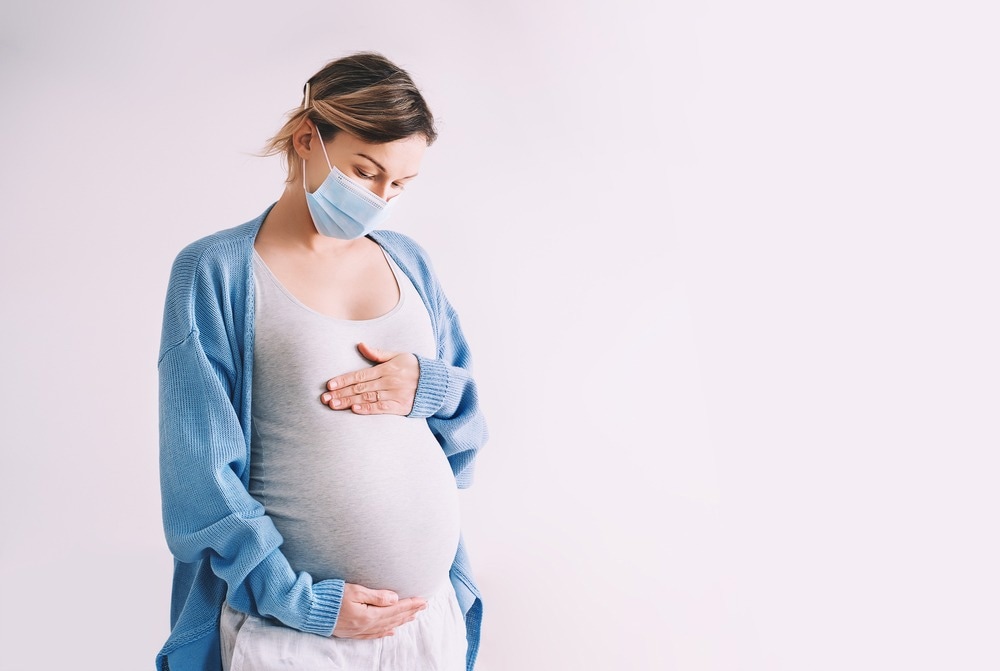In a recent study published in The Lancet, researchers evaluated the impact of severe acute respiratory syndrome coronavirus 2 (SARS-CoV-2) Omicron variant of concern (VOC) infections during pregnancy on the health of mothers and their fetuses. They also assessed vaccine effectiveness during the Omicron wave.

Background
The authors of the present study previously reported in 2021 that SARS-CoV-2 infection during pregnancy (largely SARS-CoV-2 wild-type strain infections) was associated with elevated risks of severe maternal-fetal outcomes compared to SARS-CoV-2-negative pregnant women. Ever since, several SARS-CoV-2 variants have emerged, with greater virulence, transmissibility, and immune evasiveness, challenging the effectiveness of coronavirus disease 2019 (COVID-19) vaccines and anti-SARS-CoV-2 therapeutics.
About the study
In the present INTERCOVID-2022 prospective, multinational, observational study, researchers evaluated the effects of SARS-CoV-2 infections on the well-being of the mothers and their newborns and vaccine effectiveness during the Omicron-dominant period.
The INTERCOVID-2022 study was conducted across 41 hospitals in over 18 nations (Brazil, Argentina, France, Egypt, Israel, Indonesia, Japan, Italy, Nigeria, Mexico, Pakistan, North Macedonia, Switzerland, Spain, Türkiye, Uruguay, the United States of America and the United Kingdom) between 27 November 2021, and 30 June 2022. The hospitals were registered under the international Oxford maternal and perinatal health institute network comprising research institutions extending healthcare services to mothers and newborns annually.
Women with rapid laboratory test-confirmed or real-time polymerase chain reaction (PCR)-confirmed or SARS-CoV-2 infection during pregnancy were compared with SARS-CoV-2-negative women in a 1:2 ratio. Follow-up assessments were performed for the mothers and their offspring till the mothers were discharged from the hospitals. The primary study outcomes were MMMI (maternal mortality and mortality index) scores, SNMI (severe neonatal morbidity index) scores, and SPMMMI (severe perinatal morbidity and mortality index) scores.
In addition, the effectiveness of COVID-19 vaccines was evaluated, with data adjustments for the risk profiles of the mothers. Poisson regression modeling was performed and relative risks (RR) were calculated. In the vaccine effectiveness analysis, data adjustments were made for maternal age, pre-existing comorbid conditions, obesity, and nationality. Sensitivity analysis was performed with data adjustments for maternal educational status and employment outside homes.
Omics eBook

The dominant VOC was identified based on officially published reports of every hospital’s catchment region. The team obtained pregnancy, delivery, and fetal data from medical health records and vaccination status data from vaccination registries, primary healthcare records, maternal vaccination cards, maternal oral reports, and registration systems in addition to the medical healthcare records.
Results
A total of 4,618 pregnant women were recruited, of which 33% (n=1,545) women were diagnosed with COVID-19, with median gestational age at COVID-19 diagnosis of 37 weeks, and 67% (n=3,073) women seronegative for SARS-CoV-2. Among the participants, 63% (n=2,886) had received ≥1.0 COVID-19 vaccine, and 54% (n=2,476) had received either two-dose vaccination or a third (booster) dose vaccination.
SARS-CoV-2-positive women showed an elevated risk MMMI (RR of 1·2), SPMMI (RR of 1.2), and SNMI (RR of 1.2). Unvaccinated and SARS-CoV-2-positive women showed increased MMMI risks (relative risk of 1.4). Severe SARS-CoV-2 infection enhanced the risks of adverse complications in the mother (RR of 2.5), complications in the perinatal period (RR of 1.8), and COVID-19 severity outcomes such as patient referral, ICU (intensive care unit) admissions, or deaths (RR of 12). Severe SARS-CoV-2 infection symptoms among non-vaccinated mothers elevated MMMI risks (relative risk of 2.9) and the risk of referrals, ICU admissions, or deaths (RR of 21).
Vaccine effectiveness (mRNA-1273, BNT162b2, Ad5-nCoV, BBV152 Covaxin, BBIBP-CorV, ChAdOx1-S, AZD1222, Ad26.COV2.S vaccines) for adverse complications of SARS-CoV-2 infections among fully vaccinated participants was 48.0%, which increased to 76.0% post-booster vaccination. For SARS-CoV-2-positive women, the corresponding percentages of vaccine effectiveness (cumulative for all COVID-19 vaccines) were 74.0% and 91.0%, respectively.
The sensitivity analysis adjusting for the maternal level of education, maternal employment outside of homes, and SARS-CoV-2 infection diagnosis prior to the index pregnancy yielded similar results as the main study. Being obese enhanced COVID-19’s effects on MMMI and SPMI, with an increase in patient referrals, ICU admissions, and deaths.
The effects were more pronounced among non-vaccinated women. Vaccinated mothers were more likely to have greater educational attainment, to be cohabitating or married, to work from outside homes, and to smoke lesser in comparison to non-vaccinated women. Vaccine effectiveness against severe COVID-19 was the greatest for booster messenger ribonucleic acid vaccines (81.0%).
Of importance, no apparent elevations in risk of vaccine side-effects for the mother and fetus were noted, including congenital anomalies, even among mothers fully vaccinated at the time of index pregnancy. Contrastingly, decreased risks of preterm births were observed among vaccinated women, especially those fully vaccinated at the time of index pregnancy.
Conclusion
Overall, the study findings showed that COVID-19 during pregnancy, in the initial six months of SARS-CoV-2 Omicron VOC dominance, increased the risk of adverse pregnancy outcomes, particularly among unvaccinated women with symptomatic SARS-CoV-2 infections. Additionally, the risks of serious COVID-19 symptoms, adverse complications, or deaths were lower among fully vaccinated and booster-vaccinated participants. The findings underpin the administration of COVID-19 vaccines to pregnant women.
- Villar, J. et al. (2023) "Pregnancy outcomes and vaccine effectiveness during the period of omicron as the variant of concern, INTERCOVID-2022: a multinational, observational study", The Lancet. doi: 10.1016/s0140-6736(22)02467-9. https://www.sciencedirect.com/science/article/pii/S0140673622024679
Posted in: Medical Science News | Medical Research News | Women's Health News | Disease/Infection News
Tags: Coronavirus, Coronavirus Disease COVID-19, covid-19, Education, Healthcare, Hospital, Intensive Care, Laboratory, Mortality, Obesity, Omicron, Polymerase, Polymerase Chain Reaction, Pregnancy, Research, Respiratory, Ribonucleic Acid, SARS, SARS-CoV-2, Severe Acute Respiratory, Severe Acute Respiratory Syndrome, Syndrome, Therapeutics, Vaccine

Written by
Pooja Toshniwal Paharia
Dr. based clinical-radiological diagnosis and management of oral lesions and conditions and associated maxillofacial disorders.
Source: Read Full Article
